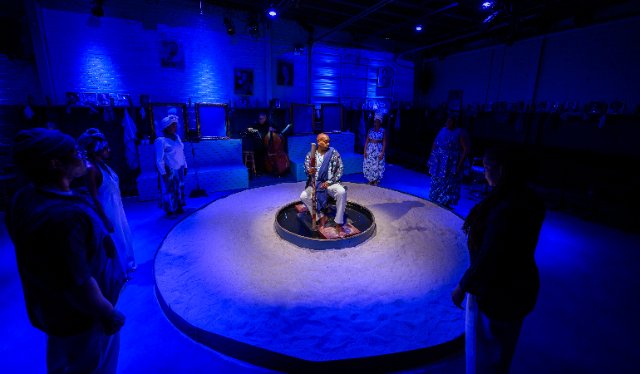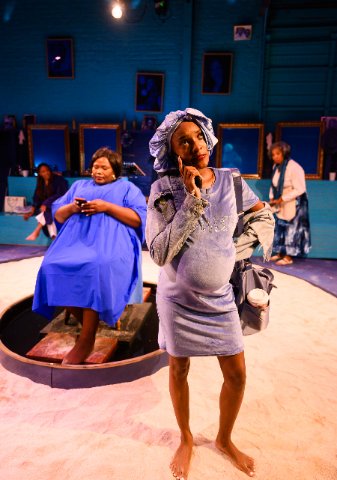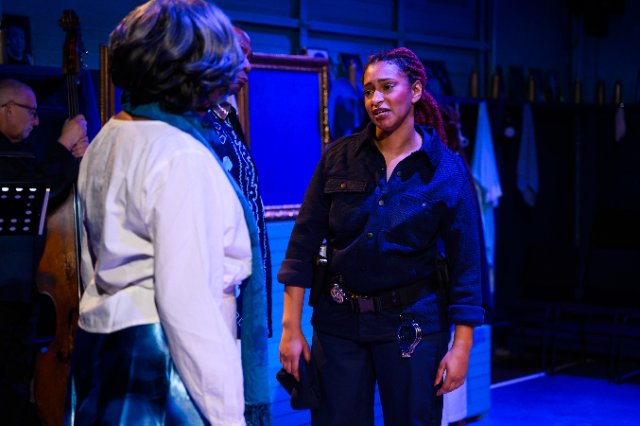A Thousand Ships
Oakland Theater Project World Premiere
By: Victor Cordell - Dec 20, 2024
Oakland, California has a much smaller population with a lower percentage of Blacks than older cities like Detroit, St. Louis, Washington, DC, among others. Yet its vibrant community has spawned an uncommon measure of African-American attainment.
To begin with, MC Hammer, the Pointer Sisters, Tower of Power, John Lee Hooker, Sly Stone, and more represent music. Basketball provides Bill Russell and enough All-Star guards for a starting five, including Jason Kidd and Damion Lillard, while baseball Hall of Famers include Ricky Henderson, Frank Robinson, Curt Flood, and Joe Morgan. There are contemporary film artists like Zendaya, Ryan Coogler, and Mahershala Ali and nationally recognized chefs like Tanya Holland and Matt Horn. Politically, you have Kamala Harris plus the wildly misunderstood Black Panthers with Huey Newton and Bobby Seale. Finally, add to that list award winning playwright, screenwriter (The Color Purple, 2023), and poet Marcus Gardley, who makes another valuable contribution to the nation’s theatrical wealth. And let it be noted that an abundance of white folk from Oakland have made their mark on the world also.
Playwright Gardley has granted the world premiere of his most recent play A Thousand Ships to the innovative and enterprising Oakland Theater Project and California Shakespeare Theater. Largely about the family that we choose, it is a touching, well-developed, and well-acted (by a truly distinguished cast) homage to the black community of Oakland from which he comes. Even every part of every character name is a place name in Oakland. Surprisingly, the story centers on women and a beauty salon, and Gardley unveils an uncommon understanding of their societies from the ways they interact to the vast array of hair products they use.
Two young women meet on a train as they abandon the South with hopes for a better life in the Bay Area away from oppressive discrimination. They open a beauty parlor in the Pill Hill (formerly Academy Hill) district and become friends and business partners for life but would face economic and personal challenges at the end.
Halili Knox endows bachelorette Adeline with verve and bluster, storming the stage with purpose. Eighty years old at the end of the story and unashamed to glow in her lasting attractiveness, she views the world as dirty and attributes her beauty to not allowing people to touch her. She draws a curious distinction with her touching others, which comes with her profession!
Dawn L. Troupe inhabits Laney with a somewhat more stolid and grounded manner. Abandoned by her husband who insisted on leaving the United States for a country that would be more receptive to Black people, Laney raised two children with the help of “Aunt” Adeline. Having started a non-profit to keep Black boys off the streets, son MacArthur (William Hartfield) is her pride and joy but would cause her consternation. Though Laurel (Sam Jackson) is devoted to her mother and her job as a policewoman, Laney has never fully accepted her as she has “Mac.”
The action pivots on the day of President Obama’s election in 2008. It plays out on Randy Wong West’s minimalist set with the “healing waters…of Black womens’ history” surrounded by the sands of shores and time. Into this setting, Adrian Roberts is the mystical Father of the Water who declaims the origin story and philosophizes about Black life.
The salon’s clients and the greater community are represented by only two characters. Rolanda D. Bell is “First Lady,” an imperious minister’s wife who lives in tony Rockridge but returns to the hood for coiffing. Her proclivities reflect diversity within the Black population and reveal unexpected complexity when the tides shift for the main characters. Jasmine Milan Williams is Dimond, First Lady’s yappy and very pregnant assistant, who brings comic relief to the proceedings each time she opens her mouth, and sometimes when she doesn’t.
Interestingly, the narrative refers to both declines and gentrification of the neighborhood. Significant are references to a prospective Starbucks. A largely unknown, undiscussed aspect of the rise of franchise chains in our economy is the devastating effect that chain businesses had on entrepreneurialism, economic independence, and community in Black populations.
In a support portion of a peer-reviewed research paper by this author in 1997, I cite the documented massive decline of Black-owned store-front businesses in the latter part of the 20th century, replaced by the likes of McDonalds, Supercuts, and Jiffy Lube.¹ Granted, these franchises are more efficient than the businesses they replace, but lost is the vital social environment and rich diversity that these institutions provided to clients, effectively a less formal place to fraternize than church. Further, buy-in costs and conditions of the franchisors eliminated ownership opportunities for virtually all Black small-business owners, depriving them of a continuing stake in the economy.
The thousand ships of the title refer specifically to slave transports which brought the ancestors of most Black Americans to this country. But it is also an important global metaphor for change, opportunity, losing out to the White man, and in the case of Laney, abandonment.
The plot line of the play, which includes several flashbacks, is compelling and important. In addition to the inherent drama, composer Molly Holm’s appealing incidental music adds emotional depth to the story. Plays are often revised after their premieres. Areas of possible improvement might be grounding the mystical elements so that their meaning is more transparent, and modifying the ending, which is genuine, but many will find it overly maudlin. The production excels, with performances delivered by a wonderfully magnetic and charismatic cast. There were a number of muffed lines at opening, but that will likely resolve in time.
A Thousand Ships, written by Marcus Gardley, is produced by Oakland Theater Project in association with California Shakespeare Theater, and plays on OTP’s stage at 1501 Martin Luther King Jr Way, Oakland, CA through January 5, 2025.
¹ Cordell, Victor V., "Implications for Small Business Export Promotion of Differences between Immigrant and Involuntary Minorities," International Trade Journal, Vol. 11, No.3, 1997.






